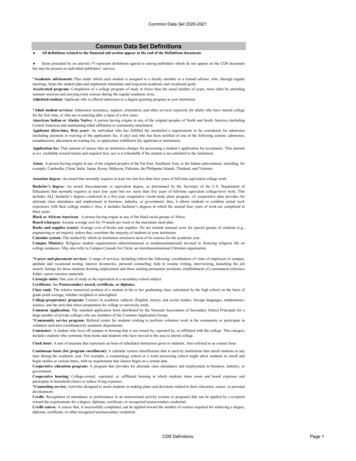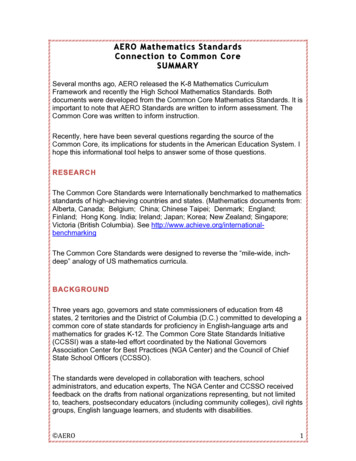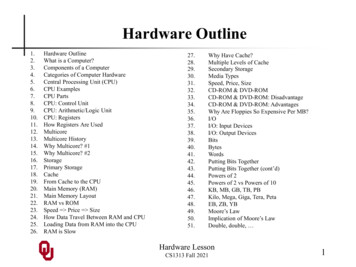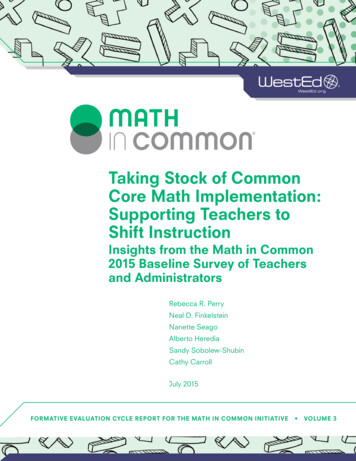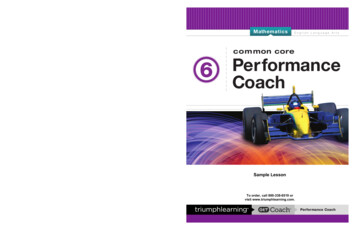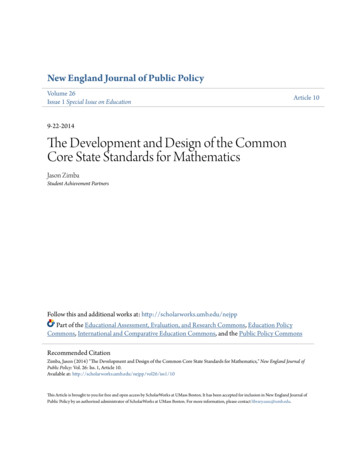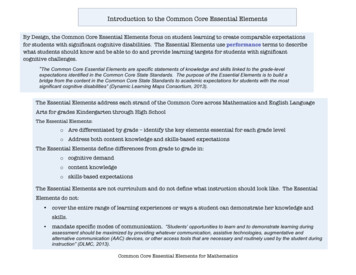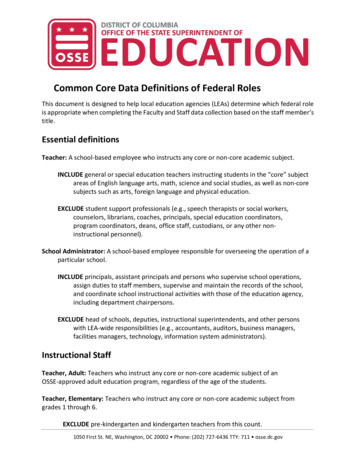
Transcription
Common Core Data Definitions of Federal RolesThis document is designed to help local education agencies (LEAs) determine which federal roleis appropriate when completing the Faculty and Staff data collection based on the staff member’stitle.Essential definitionsTeacher: A school-based employee who instructs any core or non-core academic subject.INCLUDE general or special education teachers instructing students in the “core” subjectareas of English language arts, math, science and social studies, as well as non-coresubjects such as arts, foreign language and physical education.EXCLUDE student support professionals (e.g., speech therapists or social workers,counselors, librarians, coaches, principals, special education coordinators,program coordinators, deans, office staff, custodians, or any other noninstructional personnel).School Administrator: A school-based employee responsible for overseeing the operation of aparticular school.INCLUDE principals, assistant principals and persons who supervise school operations,assign duties to staff members, supervise and maintain the records of the school,and coordinate school instructional activities with those of the education agency,including department chairpersons.EXCLUDE head of schools, deputies, instructional superintendents, and other personswith LEA-wide responsibilities (e.g., accountants, auditors, business managers,facilities managers, technology, information system administrators).Instructional StaffTeacher, Adult: Teachers who instruct any core or non-core academic subject of anOSSE-approved adult education program, regardless of the age of the students.Teacher, Elementary: Teachers who instruct any core or non-core academic subject fromgrades 1 through 6.EXCLUDE pre-kindergarten and kindergarten teachers from this count.1050 First St. NE, Washington, DC 20002 Phone: (202) 727-6436 TTY: 711 osse.dc.gov
Teacher, Kindergarten: Teachers who instruct any core or non-core academic subjectpreceding first grade. All schools that serve kindergarten students are required to reporthaving kindergarten teachers.Teacher, Preschool and Pre-Kindergarten: Teachers who instruct any core or non-coreacademic subject during the year or years preceding kindergarten. All schools that servepre-kindergarten students are required to report having pre-kindergarten teachers.INCLUDE teachers of Head Start students if Head Start is part of an authorizedpublic education program of the LEA.Teacher, Secondary: Teachers who instruct any core or non-core academic subject fromgrades 7 through 12.Paraprofessionals (General Education or Special Education): Staff membersassigned to assist a teacher with routine activities associated with teaching (e.g.,activities requiring minor decisions regarding students), such as monitoring,conducting rote exercises, operating equipment, and clerking.INCLUDE paid tutors if the position is during the regular school day, whetherdirect hire or contracted staff.EXCLUDE volunteer aides and vacant positions.Librarians/Media Specialists: Professional staff member or supervisors assigned specificduties and school time for professional library services activities. These activities includeselecting, acquiring, preparing, cataloging, and circulating books and other printedmaterials; planning the use of the library by students, teachers and instructional staff; andguiding individuals in the use of library books and material maintained separately or as apart of an instructional materials center.Library/Media Support Staff: Staff member who renders other professional library andmedia services. Duties of these staff members include selecting, preparing, caring for, andmaking available to instructional staff, equipment, films, filmstrips, transparencies, tapes, TVprograms, and similar materials maintained separately or as part of an instructional materialscenter. Include activities in the audiovisual center, TV studio, related work-study areas, andservices provided by audiovisual personnel.INCLUDE library aides and those involved in library/media support.1050 First St. NE, Washington, DC 20002 Phone: (202) 727-6436 TTY: 711 osse.dc.gov
Administrative StaffLEA Administrators: Chief executive officers of the LEA.INCLUDE head of schools, deputies, instructional superintendents, and otherpersons with LEA-wide responsibilities (e.g., accountants, auditors,business managers, facilities managers, technology or informationsystem administrators, supervisors of transportation, food services,security).EXCLUDE supervisors of instructional coordinators, supervisors of guidancecounselors, and supervisors of student support staff.Instructional Coordinators and Supervisors: This includes curriculum specialists and masterteachers. Staff supervising instructional programs at the school level.INCLUDE supervisors of educational television staff; coordinators and supervisors ofaudiovisual services; curriculum coordinators or supervisors and in-servicetraining staff, including teacher mentors; Title I coordinators and homeeconomics supervisors; and supervisory staff engaged in the development ofcomputer-assisted instruction.EXCLUDE school-based department chairpersons (these individuals are reportedunder “school administrator”).LEA Administrative Support Staff: Staff member who provides direct support to LEAadministrators, business office support, data processing, secretarial, and other clericalstaff, staff implementing software solutions, and staff who provide hardware and softwaremaintenance and data user support.School Administrators: Staff members whose activities are concerned with directing andmanaging the operation of a particular school.INCLUDE principals, assistant principals and persons who supervise schooloperations, assign duties to staff members, supervise and maintain therecords of the school, and coordinate school instructional activities,including department chairpersons.School Administrative Support Staff: Staff whose activities are concerned withsupport of the teaching and administrative duties of the office of the principal ordepartment chairpersons.INCLUDE clerical staff and secretaries.1050 First St. NE, Washington, DC 20002 Phone: (202) 727-6436 TTY: 711 osse.dc.gov
Support StaffSchool Counselors/Directors, Elementary (Grades PS-6): Professional staff assignedspecific duties and school time for counseling students and parents, addressing learningproblems, evaluating students’ abilities, and assisting students in career and personaldevelopment. Classify a counselor who works with students in preschool through grade 6as an elementary guidance counselor. If a counselor works in a middle school thatincludes grade 6, that person may be included as a secondary counselor.School Counselors/Directors, Secondary (Grades 7-12): Professional staff assignedspecific duties and school time for counseling students and parents, addressing learningproblems, evaluating students’ abilities, and assisting students in career and personaldevelopment. Classify a counselor who works with students in grades 7-12 as asecondary guidance counselor. If a counselor works in a middle school that includesgrade 6, that person may be included as a secondary counselor.School Counselors/Directors: Supervisors and directors of professional staff assignedspecific duties and school time for counseling students and parents, addressing learningproblems, evaluating students’ abilities, and assisting students in career and personaldevelopment.Student Support Staff: Professional staff members whose activities are concerned with thedirect support of students and who nurture, but do not instruct students.INCLUDE attendance officers, coaches, athletic advisors and athletic trainers;position does not require teaching credentials.Support Staff, Other: Any other support staff not defined above and support staff notreported in instructional or student support.INCLUDE equipment maintenance, bus drivers, security and food serviceworkers.The following support staff may work specifically or exclusively with studentswith disabilitiesSpecial Education Support Staff, Audiologists provide the following services tostudents with disabilities: Identification of students with hearing loss; Determination of the range, nature, and degree of hearing loss, including referral formedical or other professional attention for the habilitation of hearing; Provision of habilitative activities, such as language habilitation, auditorytraining, speech reading (lip-reading), hearing evaluation, and speech1050 First St. NE, Washington, DC 20002 Phone: (202) 727-6436 TTY: 711 osse.dc.gov
conservation;Creation and administration of programs for prevention of hearing loss;Counseling and guidance of students, parents, and teachers regarding hearing loss;andDetermination of the students’ needs for group and individual amplification,selecting and fitting an appropriate aid, and evaluating the effectiveness ofamplification.Special Education Support Staff, Counselors/Rehabilitation Counselors provide thefollowing services to students with disabilities: Guide individuals, families, groups and communities by assisting them in problemsolving, decision-making, discovering meaning, and articulating goals related topersonal, educational and career development. Provide services in individual or group sessions that focus specifically on careerdevelopment, employment preparation, achieving independence andintegration in the workplace and community of a student with a disability. Provide vocational rehabilitation services to a student with disabilities byvocational rehabilitation programs funded under the Rehabilitation Act of1973, as amended.Special Education Support Staff, Interpreters provide services to students, who aredeaf or hard of hearing, including: Oral transliteration services, Cued language transliteration services, and Sign language interpreting services.Special Education Support Staff, Medical/Nursing personnel provide servicesincluding: Medical services for diagnostic and evaluation purposes provided to determinewhether a child has a disability and the nature and extent of the special educationand related services that the child needs. Nursing services designed to enable a child with a disability to receive a free andappropriate public education (FAPE) as described in the child’s individualizededucation program (IEP), with the exception of services related to medical devicesthat are surgically implanted (e.g., cochlear implants).Special Education Support Staff, Occupational Therapists provide the followingservices to students with disabilities: Improve, develop, or restore functions impaired or lost through illness,injury, or deprivation; Improve the ability to perform tasks for independent functioning if functions areimpaired or lost; and/or Prevent, through early intervention, initial or further impairment or loss offunction.1050 First St. NE, Washington, DC 20002 Phone: (202) 727-6436 TTY: 711 osse.dc.gov
Special Education Support Staff, Orientation and Mobility Specialists personnelprovide orientation and mobility services including: Provide services to blind or visually impaired students by qualified personnel toenable those students to attain systematic orientation to and safe movementwithin their environments in school, home, and community; and/or Teach students the following, as appropriate:(a) Spatial and environmental concepts and use of information received by thesenses (such as sound, temperature and vibrations) to establish, maintain, orregain orientation and line of travel (e.g., using sound at a traffic light to crossthe street);(b) To use the long cane or a service animal to supplement visual travel skills oras a tool for safely negotiating the environment for students with noavailable travel vision;(c) To understand and use remaining vision and distance low vision aids; and(d) Other concepts, techniques and tools.Special Education Support Staff, Physical Therapists provide the followingservices to students with disabilities: Screen, evaluate and assess students to identify movement dysfunction; Obtain, interpret and integrate information appropriate to program planning toprevent, alleviate, or compensate for movement dysfunction and relatedfunctional problems; and/or Provide individual and group services or treatment to prevent, alleviate, orcompensate for movement dysfunction and related functional problems.Special Education Support Staff, Psychologists provide the following services tostudents with disabilities or in evaluations for special education eligibility: Administer psychological and educational tests, and other assessment procedures Interpret assessment results; Obtain, integrate, and interpret information about child behavior and conditionsrelating to learning; Consult with other staff members in planning school programs to meet the specialneeds of students as indicated by psychological tests, interviews, directobservations and behavioral evaluations; Plan and manage a program of psychological services, including psychologicalcounseling for students and parents; and/or Assist in developing positive behavioral intervention strategies.Special Education Support Staff, Physical Education Teachers and Recreation, andTherapeutic Recreation Specialists provide the following services to students withdisabilities as a related service (this category is not for general physical educationteachers, which should be categorized as teachers based on the grade span served): Provide adaptive physical education, movement education, or motordevelopment to students with disabilities;1050 First St. NE, Washington, DC 20002 Phone: (202) 727-6436 TTY: 711 osse.dc.gov
Assess leisure functions; and/orOffer therapeutic recreation services, including art therapy; recreation programs inschools and community agencies; and leisure education.Special Education Support Staff, Social Workers provide the following services to studentswith disabilities (general social workers should be classified as student support staff): Prepare a social or developmental history on a child with a disability; Deliver group and individual counseling with the child and family; Work in partnership with parents and others on those problems in a child’sliving situation (home, school, and community) that affect the child’sadjustment in school; Enable the child to learn as effectively as possible in his or her educationalprogram by mobilizing school and community resources; and/or Assist in the development of positive behavioral intervention strategiesSpecial Education Support Staff, Speech-language Pathologists provide thefollowing services to students: Identify students with speech or language impairments; Diagnose and appraise specific speech or language impairments; Refer for medical or other professional attention necessary for the habilitation ofspeech or language impairments; Provide services for the habilitation or prevention of communicativeimpairments; and/or Counsel and guide parents, students and teachers regarding speech andlanguage impairments.1050 First St. NE, Washington, DC 20002 Phone: (202) 727-6436 TTY: 711 osse.dc.gov
problems, evaluating students' abilities, and assisting students in career and personal development. Classify a counselor who works with students in preschool through grade 6 as an elementary guidance counselor. If a counselor works in a middle school that includes grade 6, that person may be included as a secondary counselor.
